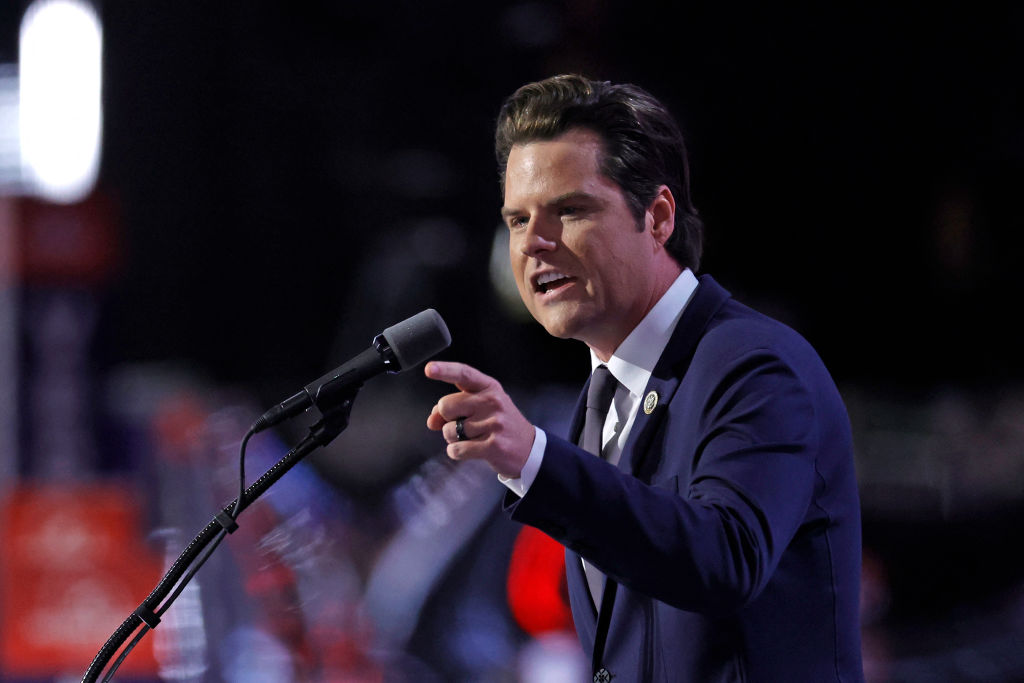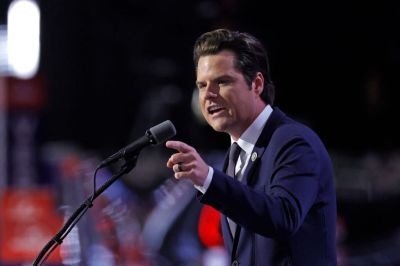I think it is likely that Matt Gaetz is guilty of everything of which he is accused and more. But I do not know what to do with that opinion.
The accusations against Brett Kavanaugh during his confirmation hearings seemed to me absurd—out of character for the man, based on supposed wrongdoing when he was a teenager, and obviously timed for a specific political purpose, i.e., to prevent his confirmation to the Supreme Court. The accusations against Gaetz are perfectly in character for the man, they preceded his nomination but are based on relatively recent events, they are attested to by more than one person, etc. But they are only accusations.
There is a kind of no-man’s-land between the sort of proof that will suffice to send somebody to prison and the kind of proof that will suffice to convince us that a man should not be attorney general or hold some other high office and the kind of proof that just makes us recoil from a man on grounds of general ick. The legal and ethical accusations Gaetz faces are both tawdry and serious—the most serious of them involve an underage prostitute—and, if they are substantiated, losing the AG spot would be the least of his worries. In the case of Gaetz, senators—and the public—are spared the necessity of diving too deeply into that to resolve this issue, inasmuch as there are perfectly adequate reasons to reject the Gaetz nomination that do not require any further proof at all: Gaetz is a cretin and a flunky, his low character is attested to publicly by members of his own party in Congress, he lacks any relevant preparation for the job at hand, etc.
But we will need to think about the question, nonetheless.
Impossible-to-prove allegations of tawdry conduct years in the past are, when weaponized, a fearsome force, one that most notably has been part of the 33-year-long campaign to discredit Clarence Thomas. As with Kavanaugh, the accusations against Thomas struck me as implausible and as a transparent political ploy. But one cannot say the same about the allegations of misconduct—ranging from drunken boorishness to sexual assault—against Pete Hegseth, a Fox News personality who is Donald Trump’s choice for secretary of defense, a position for which he is utterly unqualified, his military service having been honorable but irrelevant to the secretary’s job.
(Hegseth might have been more plausibly offered the post of secretary of veterans affairs, a position that instead has been offered to failed Senate candidate Doug Collins of Georgia, an election-conspiracy crank and, in the estimation of Georgia Secretary of State Brad Raffensperger, a “liar” and a “charlatan,” and therefore eminently qualified to take over for Hegseth at Fox News, should it come to that.)
At the time of the Kavanaugh hearings, opportunistic Democratic partisans said he should withdraw from consideration because he had been—note these words—“credibly accused.” One sees that formulation for many public figures of late, from Trump on down to the obscure. The phrase “credibly accused” entered general circulation through discussions of procedures for dealing with Catholic clergy accused of sexual abuse, and then spread to similar discussions involving other clergy, educators, etc. It retains its sexual character—one does not hear about someone “credibly accused” of shoplifting or embezzlement.
One of the problems with the “credibly accused” standard is that it is not a standard in any meaningful sense. Kavanaugh was not credibly accused of sexual wrongdoing—he was preposterously accused of misdeeds that almost certainly were invented, and his accusers were not credible inasmuch as their accounts ranged from the vague and inconsistent to the demonstrably untrue. But a “credible” accusation is, in the partisan mind, any accusation that is useful.
Treating unproven allegations as disqualifying in and of themselves—even in the case of such an obvious miscreant as Matt Gaetz—establishes or, rather, deepens, the corrosive precedent set in the Thomas and Kavanaugh cases. If we reward people for lies, or for claims irresponsibly made, then we can expect more dishonesty and more irresponsibility. Because we live in debased times, the normal defense against such public misbehavior—the shame and infamy of being exposed as a fraud and a tool—no longer apply. One can make a sort of career out of having “credibly accused” the right target, even if the claim was transparently false. As Rep. Alexandria Ocasio-Cortez of New York put it in a different context, it is more important to be on the right team than to stick to the facts.
At the same time, there are matters of character that sometimes will need to be litigated in public life even in circumstances in which we do not have access to the kind of evidentiary standards and procedural protections that would be appropriate in a court of law. If we could rely on people in positions of trust to be sensible about the “credibly” part, that would be less of a problem.
But think of all the preposterous things Donald Trump has accused people of, and of the sometimes preposterous things that Trump has been accused of beyond all of the literal felonies and noncriminal misbehavior of which he is demonstrably guilty.
Who do you imagine is the wisest man or woman in the Senate? To think about that question, even for a minute, is to understand why “credibly accused” cannot be a working standard in our time.
Editor’s Note, November 22, 2024: Fox News has asked us to remind our readers that Pete Hegseth is a former Fox News personality, having left his position there when Trump nominated him for defense secretary.







Please note that we at The Dispatch hold ourselves, our work, and our commenters to a higher standard than other places on the internet. We welcome comments that foster genuine debate or discussion—including comments critical of us or our work—but responses that include ad hominem attacks on fellow Dispatch members or are intended to stoke fear and anger may be moderated.
With your membership, you only have the ability to comment on The Morning Dispatch articles. Consider upgrading to join the conversation everywhere.